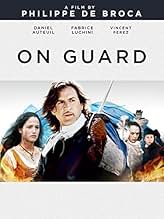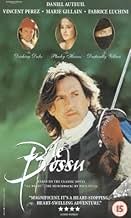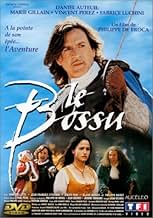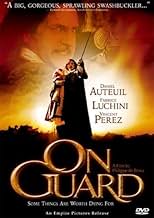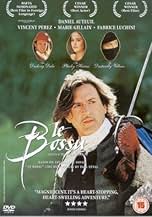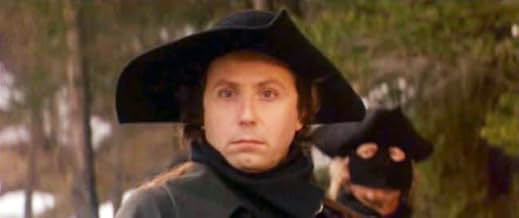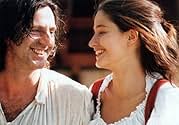NOTE IMDb
6,9/10
4 k
MA NOTE
Le comte de Gonzague manigance contre son cousin, le duc de Nevers, alors même qu'il est l'héritier du duc et héritera de ses biens.Le comte de Gonzague manigance contre son cousin, le duc de Nevers, alors même qu'il est l'héritier du duc et héritera de ses biens.Le comte de Gonzague manigance contre son cousin, le duc de Nevers, alors même qu'il est l'héritier du duc et héritera de ses biens.
- Réalisation
- Scénario
- Casting principal
- Nomination aux 1 BAFTA Award
- 2 victoires et 9 nominations au total
Jacques Sereys
- Caylus
- (as Jacques Sereys de la Comédie Française)
James Thierrée
- Marcello
- (as James Thiérrée)
Avis à la une
De Broca, who had made the marvelous swashbuckler CARTOUCHE (1962), returns to the genre after 35 years with this unexpectedly old-fashioned and highly entertaining romp.
Daniel Auteil is the unlikely hero, who is also called on to show his versatility as an actor by dressing up as the titular character. He's supported by a good cast: Vincent Perez as a womanizing aristocrat, Fabrice Luchini as a somewhat reticent villain and Philippe Noiret as a Regent; lovely Marie Gillain is Auteil's improbable love interest (she was raised by him after being saved from death's clutches).
The film's theatrical milieu brings forth obvious comparisons with SCARAMOUCHE (1952) but the sumptuous décor, Philippe Sarde's rousing score and a plot-packed narrative keep one watching. In fact, it was so well-received at the time of its release as to be nominated for several international film awards!
De Broca is a distinguished French film-maker but, unfortunately, very little of his early work is available for reassessment; I've only watched 5 myself (including this one) and all proved to be well worth watching.
Daniel Auteil is the unlikely hero, who is also called on to show his versatility as an actor by dressing up as the titular character. He's supported by a good cast: Vincent Perez as a womanizing aristocrat, Fabrice Luchini as a somewhat reticent villain and Philippe Noiret as a Regent; lovely Marie Gillain is Auteil's improbable love interest (she was raised by him after being saved from death's clutches).
The film's theatrical milieu brings forth obvious comparisons with SCARAMOUCHE (1952) but the sumptuous décor, Philippe Sarde's rousing score and a plot-packed narrative keep one watching. In fact, it was so well-received at the time of its release as to be nominated for several international film awards!
De Broca is a distinguished French film-maker but, unfortunately, very little of his early work is available for reassessment; I've only watched 5 myself (including this one) and all proved to be well worth watching.
France, 1699. The Duc of Nevers is a dashing nobleman who's cousin wishes him gone in order to inherit his fortune. His cousin, Count Gonzague pays hired swords to kill Nevers but they fail to do so, one of the men winning over the Duc and becoming his friend. When Nevers learns he has a child from an one night stand in Caylus, he sets off with Langardère to be married. However the marriage occurs but men attack the castle and Langardère is left to flee and protect the baby. He joins a group of players and hides for 20 years. However when the baby (now grown up as the beautiful Aurore) kills a man in the style known only to her father, Nevers, her presence is revealed and Langardère is forced to put things in motion for his revenge.
I have had this film sitting on a video tape for a month waiting for me to get some time to watch it. I am always put off by foreign films and often they will go to the bottom of things I have to watch simply due to the subtitles! I saw this today and thoroughly enjoyed it. The plot is quite simple although it sounds quite complex. The two acts are I, Langardère and Nevers becoming friends before the deeds and II, Langardère returning to Paris 20 years later. The plot is helped to move along by the energetic playful feel to the film. It has it's tongue slightly in it's cheek but not so much as to make a mockery of the story. Instead it has just enough wit to stop it feeling historic or creaky.
It is not without flaws however, but they are minor when viewed alongside the grand sweep of the film. I, for one, didn't totally get behind the switch in the type of love between Langardère and Aurore it was too easy after 20 years. Aside from this, the wit enables the film to get by with unlikely plot devices if the subject had been presented drier then I may have had a problem with it.
The cast is led by some great performances, none more so than Auteuil. He is good both as the angry young man who befriends Nevers, the comical hero, the protective heroic father and the hunchback of the title. He has great fun in all roles and he is fun to watch. Perez is a bit of a cad and is enjoyable while onscreen and Luchini is a good villain made comical by his almost `middle manager' sense of insecurity and being second best all the time! Gillain as the adult Aurore is pretty and it is only her romance of Langardère that didn't work for me.
Overall this is a very enjoyable film. The plot is very traditional and well worn, but the film is really helped by it's energy and wit that helps everything flow that much easier and makes, along with good performances, for a very fun film to watch.
I have had this film sitting on a video tape for a month waiting for me to get some time to watch it. I am always put off by foreign films and often they will go to the bottom of things I have to watch simply due to the subtitles! I saw this today and thoroughly enjoyed it. The plot is quite simple although it sounds quite complex. The two acts are I, Langardère and Nevers becoming friends before the deeds and II, Langardère returning to Paris 20 years later. The plot is helped to move along by the energetic playful feel to the film. It has it's tongue slightly in it's cheek but not so much as to make a mockery of the story. Instead it has just enough wit to stop it feeling historic or creaky.
It is not without flaws however, but they are minor when viewed alongside the grand sweep of the film. I, for one, didn't totally get behind the switch in the type of love between Langardère and Aurore it was too easy after 20 years. Aside from this, the wit enables the film to get by with unlikely plot devices if the subject had been presented drier then I may have had a problem with it.
The cast is led by some great performances, none more so than Auteuil. He is good both as the angry young man who befriends Nevers, the comical hero, the protective heroic father and the hunchback of the title. He has great fun in all roles and he is fun to watch. Perez is a bit of a cad and is enjoyable while onscreen and Luchini is a good villain made comical by his almost `middle manager' sense of insecurity and being second best all the time! Gillain as the adult Aurore is pretty and it is only her romance of Langardère that didn't work for me.
Overall this is a very enjoyable film. The plot is very traditional and well worn, but the film is really helped by it's energy and wit that helps everything flow that much easier and makes, along with good performances, for a very fun film to watch.
Among the various adaptations of Paul Feval's novel the modernity of that one lies in the fight scenes.
On the other hand the 1959 version starring Jean Marais was less dark. The murder of Nevers was not emphasized whereas the part is much important with Vincent Perez's great performance. Fabrice Luchini and Daniel Auteuil also give the best to their characters, but the result is less flamboyant as they are more humane.
This can be seen as the result of the Nouvelle Vague fight against the 1950s French popular cinema.
On the other hand the 1959 version starring Jean Marais was less dark. The murder of Nevers was not emphasized whereas the part is much important with Vincent Perez's great performance. Fabrice Luchini and Daniel Auteuil also give the best to their characters, but the result is less flamboyant as they are more humane.
This can be seen as the result of the Nouvelle Vague fight against the 1950s French popular cinema.
"On Guard!" is a delightful saga of a swashbuckling soap, in French, at the capable hands of veteran director Philippe De Broca. I still remember his most entertaining "That Man From Rio" 1964, with adorable Jean-Paul Belmondo and matching comedic tempo of Francoise Dorleac - it was such fun ('tis before the James Bond flicks becoming an annual feverish affair).
What drew me to "Le Bossu" (The hunchback - film's title in French) was mainly due to the 'extraordinaire' Daniel Auteuil, who's the central lead in the film. I first remember him not from "Manon of the Spring" 1987 (as Gerard Depardieu was the star) but from his portrayal of Lacenaire in "The Elegant Criminal" 1990. There's also the ever suave and attractive Vincent Perez (it's the second time seeing him acting opposite Auteuil - they were both in "Queen Margot" 1994; if you haven't seen him in the epic "Indochine" 1992 with Catherine Deneuve, go for it). And in the nemesis role, Fabrice Luchini aptly portrayed the treachery of it all. (He was fascinating to watch in director Patrice Leconte's "Intimate Strangers" 2004, playing opposite Sandrine Bonnaire.)
So with the wonderful script co-written by De Broca himself, witty dialog and intriguing plot turns, it's simply irresistible not to check out "On Guard!" It's available on DVD from Empire Pictures - Koch Lorber Films, and there are behind the scenes extras with interviews of the director, the trio of main actors and actress Marie Gillain, in French with English subtitles option.
Music is by the omnipresent maestro Philippe Sarde, with inclusion of strains from Pietro Mascagni's "Cavalleria Rusticana". By the way, there's another famous Philippe included in the cast: Noiret, indeed.
What drew me to "Le Bossu" (The hunchback - film's title in French) was mainly due to the 'extraordinaire' Daniel Auteuil, who's the central lead in the film. I first remember him not from "Manon of the Spring" 1987 (as Gerard Depardieu was the star) but from his portrayal of Lacenaire in "The Elegant Criminal" 1990. There's also the ever suave and attractive Vincent Perez (it's the second time seeing him acting opposite Auteuil - they were both in "Queen Margot" 1994; if you haven't seen him in the epic "Indochine" 1992 with Catherine Deneuve, go for it). And in the nemesis role, Fabrice Luchini aptly portrayed the treachery of it all. (He was fascinating to watch in director Patrice Leconte's "Intimate Strangers" 2004, playing opposite Sandrine Bonnaire.)
So with the wonderful script co-written by De Broca himself, witty dialog and intriguing plot turns, it's simply irresistible not to check out "On Guard!" It's available on DVD from Empire Pictures - Koch Lorber Films, and there are behind the scenes extras with interviews of the director, the trio of main actors and actress Marie Gillain, in French with English subtitles option.
Music is by the omnipresent maestro Philippe Sarde, with inclusion of strains from Pietro Mascagni's "Cavalleria Rusticana". By the way, there's another famous Philippe included in the cast: Noiret, indeed.
Not a deep film in any sense but a magnificently entertaining one nevertheless. Witty and fast-paced, it bears comparison with the highly popular 'Taxi' films. Probably my favourite French film in terms of the sheer pleasure it has given me.
Set in the France of Louis XIV and the Regency which followed his death c.1699 - c.1720, it contains a fair degree of historical accuracy. Philippe d'Orleans, Regent of France (Philippe Noiret) has a central role as the arbiter of justice who ultimately allows good to triumph over evil. This is an unabashedly romantic view of absolutist France and one should not delve too deeply into the world that is recreated here. Like Robin Hood movies, the historical backcloth provides the setting for a good swashbuckle with an underdog hero eventually triumphing over a high-born villain against all the odds.
The later plot revolves around the Louisiana scheme which saw fortunes won and lost in an early example of stock market speculation - a French equivalent of the British South Sea Bubble.
It is also a buddy movie with the main hero (Daniel Auteuil) striking up a friendship across the class barrier with the Duc de Nevers who reveals the secret Nevers sword thrust, a leitmotif which starts and ends the film and helps the (19-year?) time span hang together.
Never's scheming cousin murders him in order to inherit his fortune and the film quickly turns into a revenge movie. Auteuil saves Nevers' baby girl and heir and plots to topple the villain and to restore her to her rightful place.
Towards the end the film becomes heavily romantic and reviewers have questioned the plausibility of the resulting relationship. It is perhaps the weakest part of the plot.
The catchy score helps the film to bowl along in a relatively light-hearted way. Despite a lot of villainy and murder, the film's main tenor is one of unremitting fun. Were it being acted out on stage it would almost be a farce. Simply wonderful!
Set in the France of Louis XIV and the Regency which followed his death c.1699 - c.1720, it contains a fair degree of historical accuracy. Philippe d'Orleans, Regent of France (Philippe Noiret) has a central role as the arbiter of justice who ultimately allows good to triumph over evil. This is an unabashedly romantic view of absolutist France and one should not delve too deeply into the world that is recreated here. Like Robin Hood movies, the historical backcloth provides the setting for a good swashbuckle with an underdog hero eventually triumphing over a high-born villain against all the odds.
The later plot revolves around the Louisiana scheme which saw fortunes won and lost in an early example of stock market speculation - a French equivalent of the British South Sea Bubble.
It is also a buddy movie with the main hero (Daniel Auteuil) striking up a friendship across the class barrier with the Duc de Nevers who reveals the secret Nevers sword thrust, a leitmotif which starts and ends the film and helps the (19-year?) time span hang together.
Never's scheming cousin murders him in order to inherit his fortune and the film quickly turns into a revenge movie. Auteuil saves Nevers' baby girl and heir and plots to topple the villain and to restore her to her rightful place.
Towards the end the film becomes heavily romantic and reviewers have questioned the plausibility of the resulting relationship. It is perhaps the weakest part of the plot.
The catchy score helps the film to bowl along in a relatively light-hearted way. Despite a lot of villainy and murder, the film's main tenor is one of unremitting fun. Were it being acted out on stage it would almost be a farce. Simply wonderful!
Le saviez-vous
- AnecdotesThe original piece writing was made in 1857. The movie was produced 140 years laters that its original writing. The same time between the related history and the writing.
- GaffesWhen the Duc dubs Lagardère, the sword he draws and uses is a fencing foil, complete with guarded tip, rather than the rapier he uses in a later scene.
Meilleurs choix
Connectez-vous pour évaluer et suivre la liste de favoris afin de recevoir des recommandations personnalisées
- How long is On Guard?Alimenté par Alexa
Détails
- Date de sortie
- Pays d’origine
- Langues
- Aussi connu sous le nom de
- On Guard
- Lieux de tournage
- Fort Queyras, Hautes-Alpes, France(Caylus castle)
- Sociétés de production
- Voir plus de crédits d'entreprise sur IMDbPro
Box-office
- Budget
- 30 000 000 $US (estimé)
- Durée
- 2h 8min(128 min)
- Couleur
- Mixage
- Rapport de forme
- 2.35 : 1
Contribuer à cette page
Suggérer une modification ou ajouter du contenu manquant

![Regarder Bande-annonce [OV]](https://m.media-amazon.com/images/M/MV5BMjkxN2FiNzgtYmZkZC00Mjk2LWI2NjAtOGQ5NDhmNWI4OGIzXkEyXkFqcGdeQXRyYW5zY29kZS13b3JrZmxvdw@@._V1_QL75_UX500_CR0)
